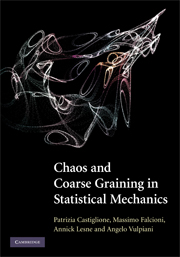Book contents
- Frontmatter
- Contents
- Preface
- 1 Basic concepts of dynamical systems theory
- 2 Dynamical indicators for chaotic systems: Lyapunov exponents, entropies and beyond
- 3 Coarse graining, entropies and Lyapunov exponents at work
- 4 Foundation of statistical mechanics and dynamical systems
- 5 On the origin of irreversibility
- 6 The role of chaos in non-equilibrium statistical mechanics
- 7 Coarse-graining equations in complex systems
- 8 Renormalization-group approaches
- Index
8 - Renormalization-group approaches
Published online by Cambridge University Press: 19 October 2009
- Frontmatter
- Contents
- Preface
- 1 Basic concepts of dynamical systems theory
- 2 Dynamical indicators for chaotic systems: Lyapunov exponents, entropies and beyond
- 3 Coarse graining, entropies and Lyapunov exponents at work
- 4 Foundation of statistical mechanics and dynamical systems
- 5 On the origin of irreversibility
- 6 The role of chaos in non-equilibrium statistical mechanics
- 7 Coarse-graining equations in complex systems
- 8 Renormalization-group approaches
- Index
Summary
If we study the history of science we see produced two phenomena which are, so to speak, each the inverse of the other. Sometimes it is simplicity which is hidden under what is apparently complex; sometimes, on the contrary, it is simplicity which is apparent, and which conceals extremely complex realities.
Henri PoincaréDevoting only a short chapter to the renormalization group (RG) is a challenge owing to the wealth of both fundamental concepts and computational tools associated with this term. The RG is indeed encountered in many different domains of theoretical physics, ranging from quantum electrodynamics to second-order phase transitions to fractal growth and diffusion processes – one should rather speak of renormalization groupS! We refer to Brown (1993) and Fisher (1998) for an historical account, to Goldenfeld (1992) and Lesne (1998) and references therein for an overview of the domains of application and variants of RGs.
We here emphasize that the RG is a way, maybe the most successful and with no doubt the most systematic and constructive, to derive effective low-dimensional descriptions that capture large-scale and/or long-time behavior. The RG can be extended far beyond the specific scope of critical phenomena, to an iterated multiscale approach allowing the construction of robust and minimal macroscopic models describing the universal large-scale features and asymptotics of a complex system. This generalized viewpoint brings out the close logical and even technical connections that bridge, within a unified framework, perturbative RG for singular series expansions, spin-block RG and momentum-shell RG for critical phenomena, RG for the asymptotic analysis of differential and partial differential equations, and probabilistic RG for the derivation of statistical laws and limit theorems.
- Type
- Chapter
- Information
- Chaos and Coarse Graining in Statistical Mechanics , pp. 217 - 265Publisher: Cambridge University PressPrint publication year: 2008



